Continuing development of the armed forces
Forum of military leaders at the Budapest Security Dialogue conference
Text: Ágnes B. Halmos | Photo: Gergely Schöff | 12:59 April 29, 2024“Since 2016, we have taken a huge step forward on the path of armed forces development, but this is not enough. The biggest challenge for us still consists in changing our way of thinking. Today, we spend more than 2% of our GDP on defence, therefore we have the political will and the financial resources available for transforming our armed forces”, said General Gábor Böröndi PhD, Chief of HDF General Staff at the forum of the April 26 conference.
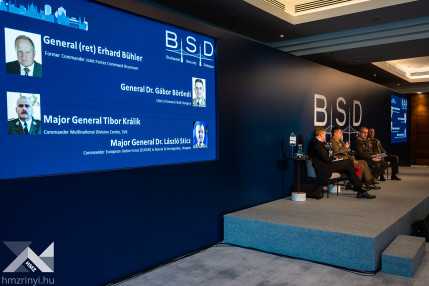
Speaking about the early challenges to the development of the armed forces, General Gábor Böröndi PhD recalled that the objective was to establish an Infantry Brigade – Heavy and a system of air defence. This process is now under way, so today, among others, the Hungarian Defence Forces have Leopard 2A4 and 2A7 tanks, PzH 2000 self-propelled howitzers and new Lynx infantry fighting vehicles in service after the conclusion of the pertaining contracts, while further items of modern military equipment are arriving continuously, one after another.
“We need all this because the world around us and Europe have also radically changed. The Russo-Ukrainian War is going on, there is a kind of palpable instability in the Western Balkans, and waves of illegal migration are coming from Africa. That is, we have to tackle many challenges” – said the Chief of Defence in listing the tasks. At the forum, it was said that we are continuously building our defence capability and training system in response to the above challenges, since – as the general noted – “we are coming from the Soviet style yet”, and he went on emphasizing how hard it is to change this way of thinking.
“When we look at the Russo-Ukrainian War, we are thinking that it is the first step towards the instability of Europe and not the last war in Europe. In the Western Balkans, we haven’t seen what is the future but some tension. We are preparing ourselves to participate in the Sahel in a kind of bilateral mission in order to stop illegal migrants. All this presents many challenges, and we are implementing a major transformation. We regularly organize exercises, and many Hungarian soldiers have already served and still serving abroad around the world – and yet, this is a huge challenge” – stated the Chief of Defence. He added that the Exercise Adaptive Hussars 2023 had been conducted to serve this purpose through the concentration of our forces in the northern part of the country and our cooperation with the civil sphere. “We are taking seriously the goals of defending the citizens of our country and of being a good NATO Ally” – pointed out the general.
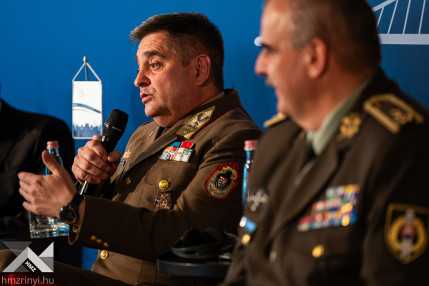
In answer to a question, the Chief of the General Staff said that beyond armed forces development, the objective of the Hungarian armed forces development program is to build a military industry complex, so that we can not only just purchase and commission items of military equipment, but also get a foothold in the industry through defence industrial enterprises. That is why Hungary – similarly to the development of the automotive industry – has started the construction of factories and founded defence industrial companies to which the Hungarian engineers contribute their professionalism and their answers to the problems” – he added.
Another topic of the panel discussion, the current security situation of the Western Balkans and especially that of Bosnia and Herzegovina was expounded by Major General László Sticz PhD, Commander, EUFOR Operation ALTHEA, a military mission that is being conducted with the participation of 23 nations. He emphasized that there are positive developments in the region of the Western Balkans because almost all of the countries would like to join the European Union and NATO. These countries are developing to join these organizations on the basis of an accession roadmap, which creates stability in the region. Moreover, the representatives of military, EU-led and other international organizations stationed in the region are providing assistance with this process.
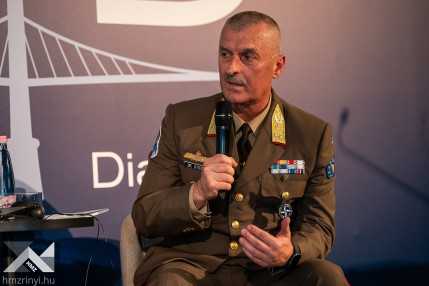
The commander also noted that besides Bosnia and Herzegovina, a number of other countries in the region are also struggling to meet internal challenges in the fields of politics and the economy. However, some external actors are interested in the region and have the opportunity and capability of dialogue in addition to their ability to influence the development of these countries, which are rife with these external and internal factors alongside challenges such as terrorism, illegal migration, corruption and other security-threatening factors.
“Returning to Bosnia and Herzegovina, the state structure is very complicated and so it is difficult to lead a country like this. I can say that the political leaders know their way around what and how things should be done, and if they persist, they can achieve their goals at the end of the day. I’d like to underline that not only the soldiers but also the political leaders must observe two principles. One is cooperation and the other is unity. I don’t think that military organizations or states and countries could effectively function without these two guiding principles” – said Major General László Sticz PhD, adding that the majority of the population is satisfied with EUFOR’s presence.
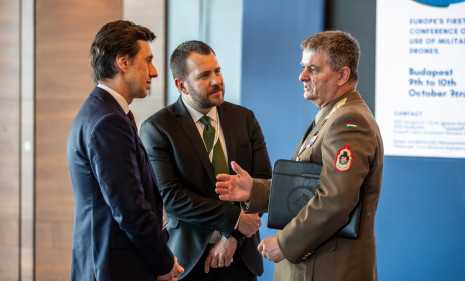
Cooperation is the Future
11:20 April 29, 2024
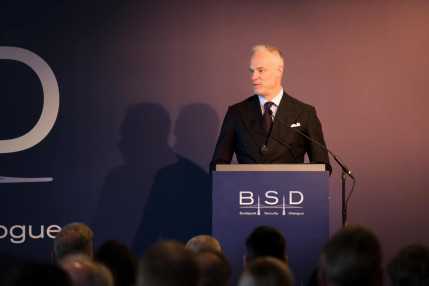
Peace is the most Important!
12:52 April 29, 2024